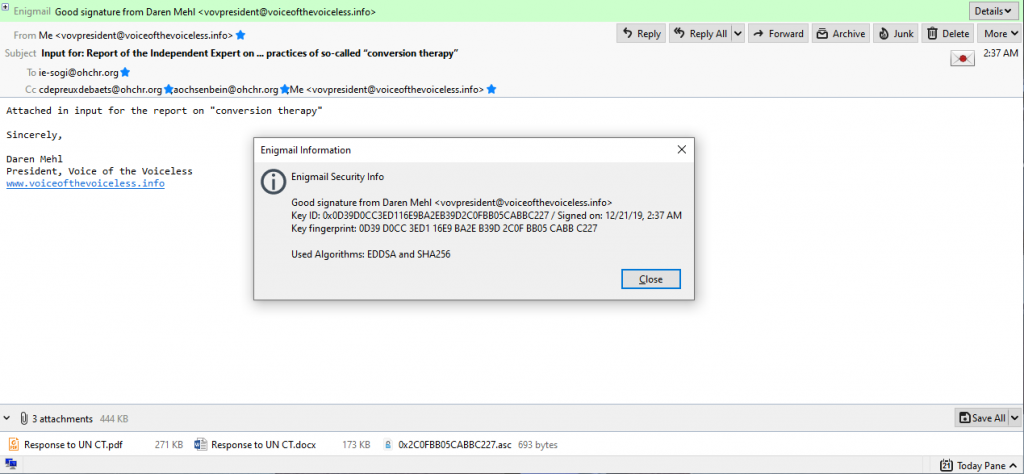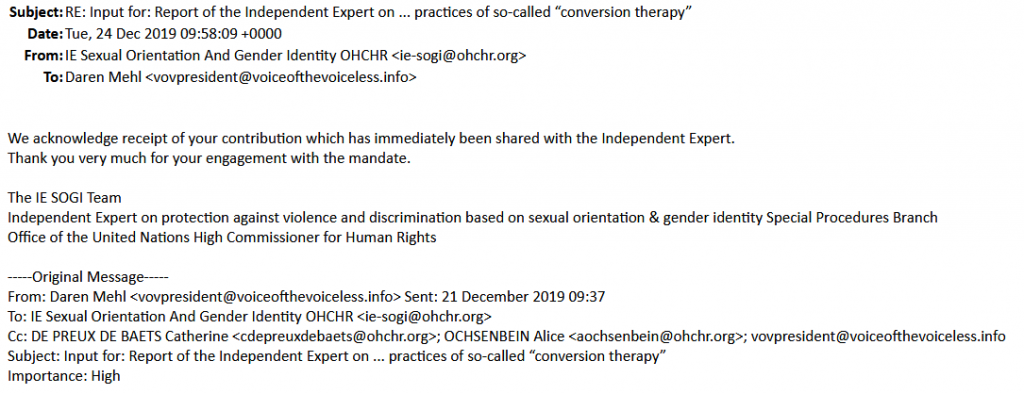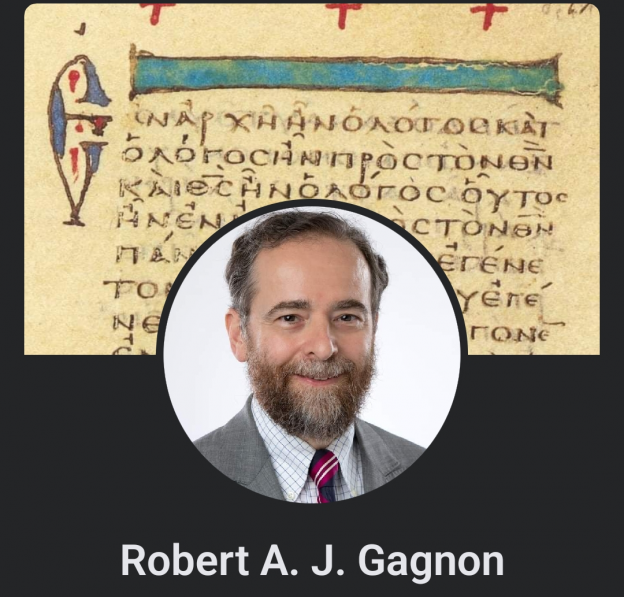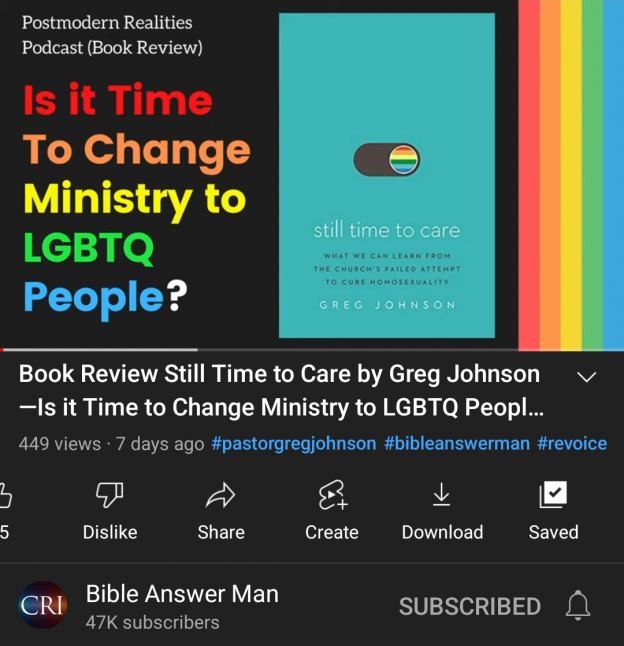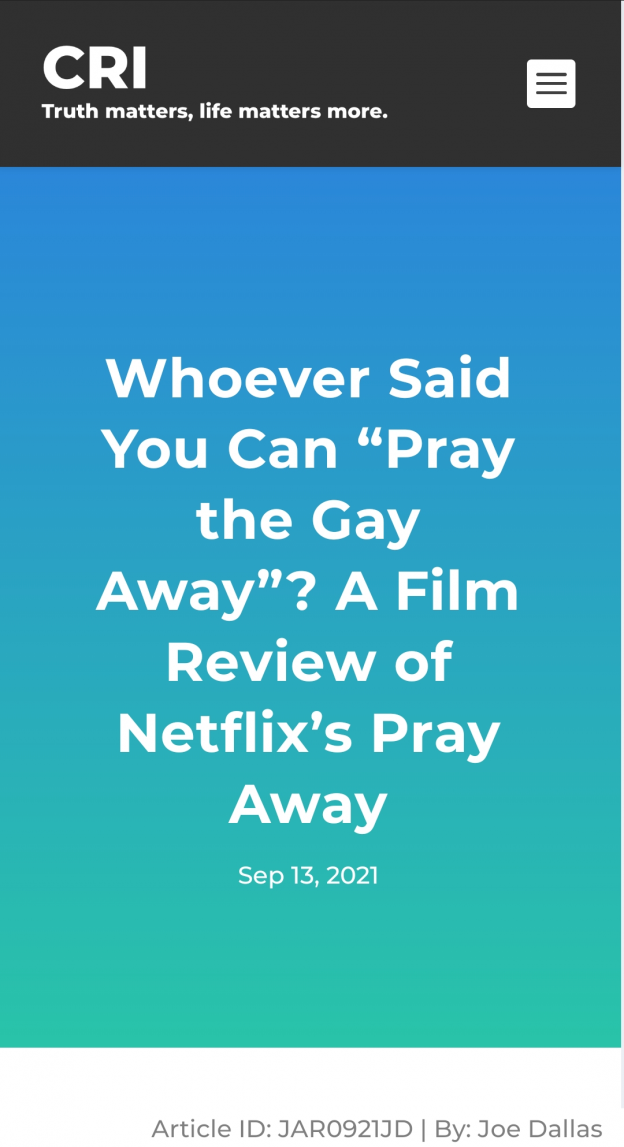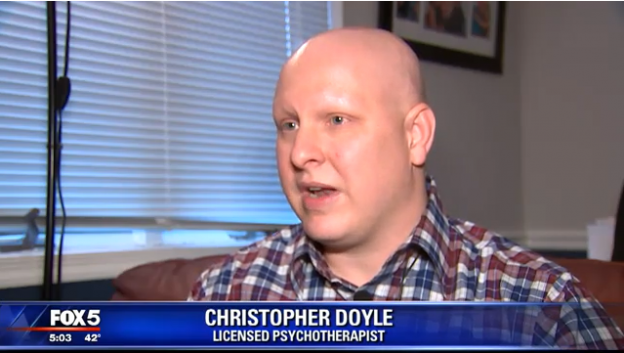Response to UN CT
Download Report
Dear Independent Expert,
Your request for information suffers from an immediate case of the fallacy of equivocation. Your definition of Conversion Therapy (“C.T.”) conflates anything and everything that could possibly relate to a change in sexual orientation or desistence or detransition from a gender identity incongruent with one’s sex. This results in being in an incredibly difficult position to be able to discuss the nuances necessary to intelligently understand this topic.
Your definition of C.T.:
- any purported treatment having the objective or presenting itself with the objective to change a person’s sexual orientation or gender identity.
- gay cure
- Reparative therapy
- ex-gay therapy
- sexual orientation change efforts
- religious and spiritual interventions
- smartphone app-sponsored programs offering a 60-day “gay cure”
- some licensed medical professionals
- psychologists
- administering of cognitive-behavioral therapies
- drugs
- physical interventions
- electric shock treatment
- aversion techniques
Henceforth, when we use the term C.T. as broadly as you have, we will also use sufficient detail as needed to insure we are able to speak to the nuances you’re missing. To become an “expert” on this topic, you should be very precise as to which types of approaches in the broad group of C.T. you are discussing.
You stated that “recipients of these treatments include lesbian, gay, bisexual, trans and gender diverse people, ranging from children to adults.” In reality, clients who voluntary seek C.T. do not embrace such LGBTQ identities. Recipients of these treatments identify as heterosexual individuals struggling with unintentionally eroticized same sex attractions or egodystonic homosexuality. The married heterosexual man who, out of curiosity (questioning), discovered gay porn and became addicted but decided it wasn’t for him and needs help to end the destructive behavior to save his marriage. Or the male child who had no inclination toward same-sex erotic behavior but was sexually abused by a man from the ages of 5 to 15 and has neuroplastic-induced reorientation of erotic attraction and thus desires to resolve those issues to return to his authentic heterosexual self. There is a large community of such people who have had positive outcomes from the use of certain types of C.T. See www.voiceofthevoiceless.info www.changedmovement.com www.twoprisms.com www.therapyequality.org/factsheet
“The report will explore the human rights implications of these practices and interrogate their relationship with violence and discrimination based on sexual orientation and gender identity. It will discuss the forms and scope of “conversion therapy” (hereinafter, “C.T.”) as it is practiced across the globe, its impact on the persons that are subjected to it, measures adopted to prevent its practice and to penalize or prosecute those who perform it, and remedies provided to injured parties. Finally, the report will formulate recommendations.”
The human rights of this issue are not limited to just the violence and discrimination reported by individuals. The human rights of this issue also include the right to self-determination (which is one of the foundational ethical principles in psychotherapy) and the free practice of religion. Individuals have the right to seek out therapies, religious practices, and other practices to address their outcome goals. Your request for information should be widened as there are more human rights to consider related to C.T. (By your own definition it includes religious practice and speech.)
Claims of persons being involuntarily subjected to C.T. are highly suspect and likely exaggerated. The majority of clients obtaining C.T. willingly seek it out and go through standard informed consent procedures. Many people seek assistance to address known or believed incongruency between their sexual orientation or gender identity and their religious beliefs or understanding of their authentic self. Preventing access to desired practices of C.T. would in itself be a human rights violation.
“The information-gathering process will also include a literature review and expert meeting, a consultation, and possibly a survey.”
I would recommend that you review literature from www.therapyequality.com/factsheet and from www.changedmovement.com as these present specific research information and testimonies, respectively, that you have likely not reviewed as they are regularly censored from coverage in media or search engines. If you create a survey, we recommend you include the possibility of positive outcomes of therapy or counseling, religious practice, and note that some people seek it out rather than are forcibly subjected to it. After all, they have human rights as well.
“These practices appear to be based on the assumption that seeking to change a person’s sexual orientation and/or gender identity deviating from what is seen as the norm in a particular time and a particular place is an acceptable societal, community, family and personal objective.”
Assuming the motivations are limited to seeking norms, i.e. statistical commonness, ignores any moral imperatives from a person’s religious beliefs and/or cultural beliefs. Aligning your behaviors and identity to your religious convictions as a personal objective for practices of C.T. is a human right.
“Forms of “C.T.” have been condemned by world health associations[1], United Nations entities[2] and human rights mechanisms such as the Committee against Torture, which have expressed that the practice can amount to torture, cruel, inhumane or degrading treatment.[3] It appears to produce long-lasting negative effects on individuals subjected to the practice, as it can lead to physical and deep psychological harm, such as depression, anxiety, drug use, homelessness, and suicide.[4] It also appears that children under legal age are especially vulnerable to it.”
Your definitions of “C.T.” include some behaviors which could be regarded as torture, such as electro-shock. However, other therapeutic modalities listed previously do not exhibit this property. Trying to group the beneficial and effective forms of therapy with the ineffective or harmful forms is merely the fallacy of equivocation, where the definition of “C.T.” changes from one use to another. Additionally, you’re making an argument to authority, another fallacy, rather than based on conclusive or nuanced research. As stated previously, please visit www.therapyequality.org/factsheet for more nuanced and decisive statements.
“In a few countries, such as in Malta and Ecuador,[6] [Conversion Therapy] is considered a criminal practice.”
In Malta, we can see the immediate effects of a poorly executed C.T. ban. Like your own practice of broadly defining C.T. to include anything and everything that addresses human sexuality or gender identity. Take the following example[1]:
Matthew Grech raised controversy after his audition on the musical talent show X Factor, where he used his pre-audition interview to explain how he had led a “homosexual lifestyle” in the past, but had then “found God”.
The Government in fact released a statement following the airing of the show, condemning any “homophobic” comment and said that the broadcast of such a clip did great damage and put at risk many youths who are vulnerable for gay conversion practices.
Malta has conflated life experience, religious beliefs, and personal testimony with C.T. when they discriminated against the religious beliefs and personal testimony of the television talent show contestant Matthew Grech. He shared his experience of a change in sexual orientation which he attributed to faith. They misconstrued his experience as “Conversion Therapy.” The Malta government went as far as to say that children exposed to his testimony may be harmed.
“Even though “C.T.” seems to be widespread, information on the subject is insufficient. There is little systematized knowledge on:
- The social norms, beliefs and systems that underlie the practice;
- The consequences of these practices on victims; and
- Good and best practices in legislations, jurisprudence and public policy in relation to these practices.”
Your view of “C.T.” being widespread may be due to your over-broad definition of the term, which is itself merely a strawman argument. We recommend reviewing www.therapyequality.org, which is full of information that is sufficient to show therapies are helpful and research in this field is extensive and productive.
The characterization of “C.T.” as the singular “the practice,” is in error. Your definition of “C.T.” in fact includes many disparate practices. Your belief that social “norms” underlie “the practice” is itself also an unfounded assumption. It is not “norms” which guide beneficial and effective therapies and therapeutic techniques. In some cases, such as Christianity for the religiously motivated (such as Matthew Grech or myself) direct commands from the Apostles, such as 2 Peter 1:5-7, seem to be conflated as C.T.
If you want to ensure all human rights are protected by your report, you should also research the benefits of these practices on people who seek them out.
Your title of “expert” of “human rights” will not be justified until you include those who have experienced change of sexual orientation or desisted or detransitioned from a transgender identity. Voice of the Voiceless ([email protected]) can provide a delegation from our former LGBTQ+ identified community to speak on our life experiences. We can also provide licensed mental health professionals to speak to the practices which are not torturous or harmful but quite beneficial and effective to those seeking them.
The United States Constitution provides easily systemized knowledge on the best practice of disallowing far-reaching governments from interfering with religious exercise.
“The consultation process aims at gathering information on the above mentioned areas through input from all relevant stakeholders, for the ultimate goals of raising awareness and supporting effective State measures through identifying best practices in legislations, jurisprudence and public policy, as well as shortcomings and discrepancies with human rights norms, in relation to “C.T.” To inform my report, I am seeking inputs with information, data and views from all relevant stakeholders…”
Relevant stakeholders MUST include those who have willingly benefitted by effective religious practices and therapeutic modalities you’ve lumped into C.T. To leave out the formerly homosexually identified individual who has had a change in sexual orientation, or the de-transitioned or desisted individual would be a failure of your report to reflect the entire truth and represent all the individuals impacted by your report. An intentional oversight of our stakeholder community would disqualify anyone having the title of “expert” on C.T. and leave your report as another form of propaganda feeding the bigotry against us, resulting in further denial of our human rights.
“Are there definitions adopted and used by States on practices of so-called “conversion therapy”? If so, what are those definitions and what was the process through which they were created or adopted?”
The ones we’ve seen are uselessly broad and are very ineffective to prevent harm. The definitions are sufficiently vague so as to include items which are sought out and used beneficially. As stated previously, the lazy use of a broad and vague statements to define C.T. will have negative impacts on our community’s human rights.
“What are the current efforts by States to increase their knowledge of practices of so-called “conversion therapy”? Are there efforts to produce information and data on these practices?”
States are restricting their ability to understand these practices by not including the voices of those who have benefitted from some of the “C.T.” techniques you’ve grouped in with the negative “C.T.” Many people have been helped by talk therapy and religious practices. Please review www.voiceofthevoiceless.info, www.changedmovement.com, www.twoprisms.com, and www.therapyequality.org for examples of voices that are being censored by states.
“What kinds of information and data are collected by States to understand the nature and extent of so-called “conversion therapies” (e.g. through inspections, inquiries, surveys)?”
None. There is no evidence in the United States of an epidemic of “conversion therapy” going on with licensed therapists. For example, in Minnesota, “The MN Board of Marriage & Family Therapy has not issued a disciplinary or corrective action order where conversion therapy was a relevant fact. Accordingly, there is no public Board finding or determination addressing conversion therapy.[2]” These therapy bans seem to be preemptive based on hysteria of an imaginary epidemic of aggressive conversion therapists coercing clients.
Voice of the Voiceless has found no evidence that any data on information addressing the training or educational materials describing techniques, steps or processes in a therapeutic modality described by those materials as “Conversion Therapy.” Therefore, we suggest re-framing the investigation into specific techniques or modalities which have been proven to be harmful.
Has there been an identification of risks associated with practices of so-called “conversion therapy”?
There are indisputable harms caused by some of the practices lumped under the term “C.T.” However, other modalities lumped under this term have been investigated for client-reported harm, finding equal or lower rates corresponding to typical client-reported harm rates from other forms of licensed therapies. Of note, most client-reported harm of beneficial and effective therapeutic modalities fell into the category of increased awareness of one’s own emotions, which many therapists consider to be an intermediary step in the healing process. By the APA’s own admission in the 2009 taskforce report, there is insufficient rigorous data on modern forms of SOCE to show harm. (Page 42[3])
Broader statutory rules or administrative policies to ensure accountability of health care and other providers
Currently the laws in some states are preventing health insurance companies from reimbursing individuals who seek help to reconcile eroticized same-sex attractions with their faith, or even address abuse related to same-sex experiences, even though those insurance policies cover other psychological services. This is a violation of their human rights for equal access to healthcare. Restricting the healthcare for individuals seeking it could lead to further depression and suicidal ideation.
Are there any State institutions, organizations or entities involved in the execution of practices of so-called conversion therapy? If so, what criteria have been followed to consider these as a form of valid State action?
Organizations are performing “sex change” surgeries on individuals or recommending untested hormone treatments for minors. This is the true definition of conversion therapy, which is harmful.
There is no scientific data to prove that homosexual attractions or behaviors are biologically determined or that sexual orientation is immutable. There is research indicating sexual orientation can change[4] and not a viable category for rights.
[1] https://www.independent.com.mt/articles/2018-10-30/local-news/Matthew-Grech-demands-government-and-MGRM-apology-after-audition-clip-was-removed-6736198595
[2] http://bit.ly/NTFTE-MN01
[3] APA Task Force on Appropriate Therapeutic Responses to Sexual Orientation. (2009). Report of the Task Force on Appropriate Therapeutic Responses to Sexual Orientation. Washington, DC: American Psychological Association.
[4] http://bit.ly/LDExplains01
UN Request for Input
Call_for_Inputs_EN
